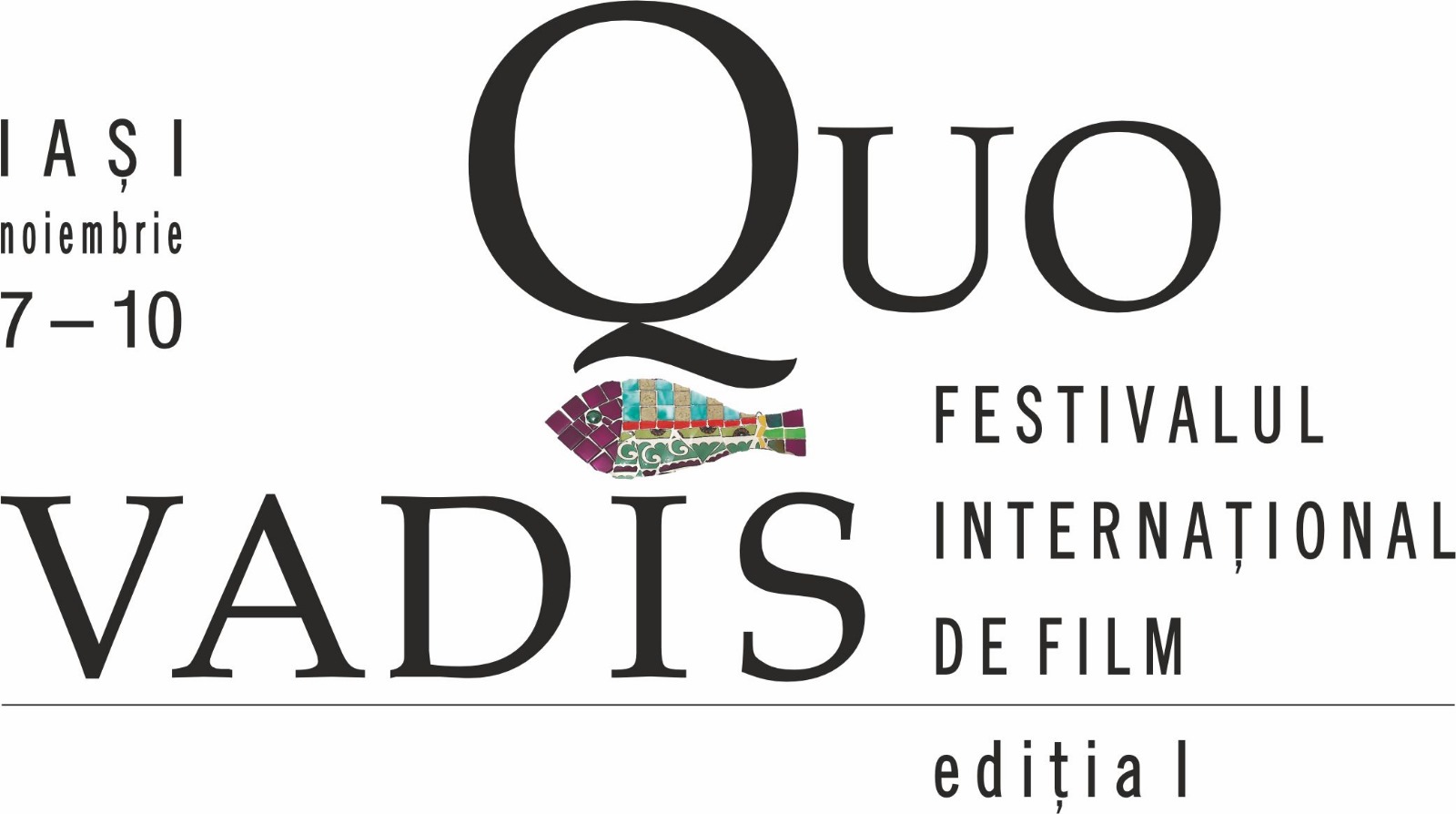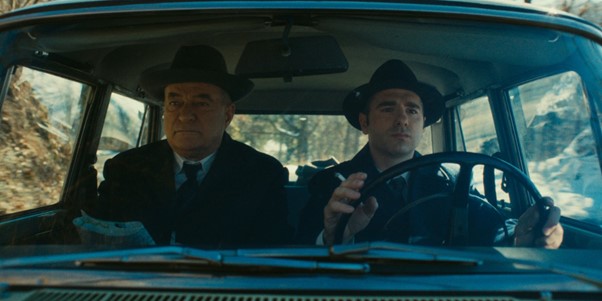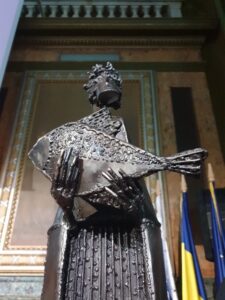
From 7 to 10 November 2024 Iași (Romania) hosted the first International Film Festival Quo Vadis? and became for these four days one of the brightest spots of Europe.The Film Festival organised and supported by the Metropolis of Moldavia and Bukovina, with distinguished artistic director Elena Dulgheru[1] – a professor and film critic, executive director Violeta Gorgos[2] and Festival producer Cătălin Jeckel, celebrated thirty-five years after the December Revolution in 1989, thus devoting this first edition of the Festival to the theme of freedom. In the words of the artistic director “freedom can only be lived in the understanding of our neighbour as a brother, as a child.”[3] Nested in the cordial, small picturesque town of Iași, locating artistic events in the diverse historically significant venues, the Festival with its enthusiastic team composed of professionals and volunteers, welcomed all participants with the same warmth: from Archimandrite Ephraim the Abbot of Vatopedi Monastery, over the artistic photographer Yuri Mechitov, the Emmy award-winning actor Johnathan Jackson, the film directors Ernest Abdyzhaparov, Hadži-Aleksandar Đurović, Andrej Šepetkovski to many other significant guests. One of the most important moments of the Festival lay in the celebration of two major jubilees: 100 years since the birth of the cinema giants Tengiz Abuladze and Sergei Parajanov, both from the Caucasus.
The title Quo Vadis? inspired by the historical novel by Henryk Sienkiewicz aims, in the words of the Festival, to “cultivate the spiritual and cultural heritage of Christianity through film, highlighting the transformative power of film, its ability to reflect the human experience through the lens of Christian spirituality, while encouraging the dialogue and communion within and beyond.”[4]
As Elena Dulgheru explains, Quo Vadis is the question of “where we are heading ourselves, as a country, as a church, and as a festival.” Quo Vadis, in a sense thus “addresses the issue of consciousness of lucidity in the treatment of history…with the idea to create an intellectual and artistic dialogue”, as from such a festival we can then also “understand how Christianity will be lived from now on and how it can be in the future.”[5]

While rooted in Christian tradition the Festival welcomed filmmakers, professionals and audiences from various backgrounds, highlighting the universal themes such as faith, love, redemption, and salvation found in cinema, and recognizing, from an eschatological perspective, the dignity and worth of the person.[6]
The selection of films was based on significant artistic merit, novelty and authenticity, which embed human values akin to those found in great literature and great cinema.[7] In words of Elena Dulgheru, in this Festival we are “face to face with all the best in terms of creativity, with a Christian vein and humanistic vein in general, not only in Romania, but also other Christian countries, especially Christian Orthodox, but we are also interested in the humanistic offer of other countries and cultures that may have preserved more spirituality and spiritual freshness than we have now.”[8] That is why within the Festival a Medallion of Central Asian Film has been proposed – for instance Central Asian Islam provides “many lessons about Christianity”, and this Festival is about culture open for dialogue that does not impose but rather offers its own life experience.”[9] Furthermore, in that respect, the idea behind the Festival is “not to be closed within a cultural enclave or within explicit ‘church culture’” but rather to “overcome divisions” by addressing everyone and discovering human being and humanity, “it is about films that build the human soul.”[10] These are the films that delve into themes of faith, spirituality, and moral values through a Christian lens, conveying faith, love, hope, compassion, forgiveness, and humility.[11]

The Festival included lectures and round tables such as the one on “Ethics and Aesthetics”[12] to foster dialogue moving the boundaries in artistic and scientific sense and connecting different Festivals and artists across the world.[13] The participants, artists professionals and scientists, considered film, form and poetics, film genre and the holistic approach to film. For example, Elena Dulgheru opened a new avenue in reconsidering the elements of film genre, for both researchers and artists, “from a spiritual perspective – be it religious or not – but especially from a Christian one, horror genre (both in literature and in film) distorts in its essence the transcendental sense of suffering and death.”[14] The aforementioned holistic approach in art represented an additional novelty that Quo Vadis? introduced.
It is important to note that the Quo Vadis? International Film Festival posed two tasks before itself and the world: 1) to redefine our understanding of ‘religion and film’, that is, to go beyond ‘religious film’ and 2) to place Orthodox Christianity centre-stage in cinematic art. In the case of the former it is important to remember that “theology sometimes has highly formalised language, however if the word is emptied of meaning it is a form without substance” and it is art that in that sense, unburdened from dogmatic precision, serves as the complementary avenue in facilitating the dialogue.” In the same sense, if art is subordinated to form without substance it remains a product for the masses.While “we can talk about prayer and elevation, these must not become forms without a foundation”, not merely because then “they do more bad than good”, but because they fail to transfer the authentic and honest experience of faith and what it means to be human. Form, in cinematic art traditionally highly valued for cultivating that which the condensed story cannot convey, in this sense must also be revisited and revised.
The latter strongly engages theology and art, which in Orthodox Christianity has a long tradition, but which in terms of cinema has been underrepresented in ‘Western academia’ and understudied, perhaps mostly due to the historical political circumstances of the 20th century in the countries considered traditionally Orthodox. It is crucial to note that although Christianity does not produce “enclaves”[15] it has been reduced to enclaves in both the post-Christian and post-communist world. At the same time, this Festival encourages those artists “who want to create in the Christian space, who recognize their Christian identity and who may not have the courage to express or think there is no chance anymore – they must know that there is, and that there is a space for dialogue.”[16] Thus, the expected “second edition” of the Festival will aim, in the words of Dulgheru, to provide an even stronger “platform for live dialogue and the coagulation of identity consciousness of film and artists.”[17] Perhaps one of the most invigorating aspects of the Festival is in bringing forward the novel understanding of both historical and new cinematic masterpieces and moving boundaries in cinematic creation.

The awarded films[19] offered new themes, experiences, new forms and visions, vital for the further understanding of the development of film language and the nature of film aesthetics.[20] Orthodox Christianity plays a crucial role in laying the foundations of the spirit, the idea and the meaning of the Festival and in that respect is revealed as a way, perhaps for many ‘an alternative way’, to rediscovering art as the highest expression of homo creator in striving for resurrection[21], unburdened with the past and contemporary ideologies and global trends. Quo Vadis? as Christian oriented Festival however does not strictly address one denomination, but everyone in trying “to discover the human” and in that sense demonstrated the unexpected: the breadth in embracing humanity and the world. In bringing forth to the audience the cinematic artwork, almost impossible to be seen even in the art-house cinemas and special online platforms, and in conveying freedom of expression for both the artists and professionals, the Quo Vadis? International Film Festival indeed shone as “a beacon of light”, proving once more that cinema indeed is a “cosmopolitan art.”[22]

Footnotes:
[1] Elena Dulgheru is a member of UCIN and FIPRESCI, with more than 48 works in collective volumes and specialized publications from Romania and abroad, including Erotico-Apocalyptic. Poems from the Temple of the Father, 2015; Tarkovsky. The film as a prayer. A Poetics of the Sacred in the Cinema of Andrei Tarkovsky, 2014; For the passing of dawn and other poems, 2011; Stairway to Heaven in the cinema. Kusturica, Tarkovski, Paradjanov, 2011; Talking to Marina Tarkovskaia, 2004; Tarkovsky. The film as a prayer. A poetics of the sacred in the cinema of Andrei Tarkovski, 2002.
[2] Violeta Gorgis is a musician, artist, screenwriter, and a director with a PhD of the Academy of Sciences of Moldova, Institute of Art History and Theory, Department of Cinematographic Art – Television.
[3] Elena Dulgheru, https://www.youtube.com/watch?v=DvVCXPM18gA
[4] https://quo-vadis.ro/en/story
[5] Elena Dulgheru, https://www.youtube.com/watch?v=DvVCXPM18gA
[6] Elena Dulgheru, https://www.youtube.com/watch?v=DvVCXPM18gA
[7] Elena Dulgheru, https://www.youtube.com/watch?v=DvVCXPM18gA
[8] Elena Dulgheru, https://www.youtube.com/watch?v=DvVCXPM18gA
[9] Elena Dulgheru, https://www.youtube.com/watch?v=DvVCXPM18gA
[10] “These are the films that in that sense consequently build the society with moral values.” Elena Dulgheru. https://www.youtube.com/watch?v=DvVCXPM18gA
[12] QuoVadis2024 – „Etica și Estetica în film” https://www.youtube.com/watch?v=CVOmwdvdzHk
[13] Byzanfest, https://www.byzanfest.com
[14]“For Christians, but for the traditional believer in general, suffering and death are a gateway to encounter Christ, and not subjects for terrifying fear. Suffering, in general, is a path to acquire humility, which is a Christian value, and therefore to get closer to Christ. art, the option to represent suffering with the body degradation caused by it, and death, in terms of horror and to sell horror as an aesthetic value is a cheap solution and a matter of bad taste. From many points of view, horror genre resembles that of hard-core eroticism and pornography.” Elena Dugheru.
[15] Elena Dulgheru, https://www.youtube.com/watch?v=DvVCXPM18gA
[16] Elena Dulgheru, https://www.youtube.com/watch?v=DvVCXPM18gA
[17] Elena Dulgheru, https://www.youtube.com/watch?v=DvVCXPM18gA
[18] https://sacredalaskafilm.com/
[19] THE QUO VADIS TROPHY are awarded to: THE VATOPEDI MONASTERY / ARCHIMANDRITE EPHRAIM for the support given in the making of Christian-Orthodox films as a means of preaching the Gospel; NICOLAE MARGINEANU for highlighting in his filmography the Freedom as fruit of the confessing the faith in the prison conditions of the communist regime; JONATHAN JACKSON for highlighting in the film Saint Joseph the Hesychast the Freedom as fruit of the ascetic struggles and of the Prayer of the Heart; BOGDAN ALBU for highlighting in his film 500 the Freedom as fruit of the sacrifice for others; ASEL ZHURAEVA for highlighting in his film God’s Gift the Freedom as fruit of defending pro-life values; BAKYTBEK MUKUL AND DASTAN ZHAPAR for highlighting in their film Road to Eden the Freedom as fruit of sacrificial friendship; CRISTINA CHIRVASIE for highlighting in her filmography the Freedom as fruit of adhering to patterns of Christian living; HADŽI-ALEKSANDAR ĐUROVIĆ for highlighting in his filmography the Freedom as fruit of spiritual asceticism; ERNEST ABDYZHAPAROV for highlighting in his film Narrator the Freedom as fruit of preserving national identity; ANDREJ ŠEPETKOVSKI for highlighting in the movie The Service the Freedom as fruit of witnessing faith under political oppression; IVAN JOVIĆ for highlighting in his film Lazarus Path the Freedom as fruit of self-knowledge; SIMON SCIONKA for highlighting in his film Sacred Alaska the Freedom as fruit of embracing the Christian Orthodox faith; TRINITAS TV for highlighting in its filmography the Freedom as fruit of knowledge and understanding of history; DOXOLOGIA for highlighting in its filmography the Freedom as fruit of knowledge and understanding of history; KENZHEBEK SHAIKAKOV for highlighting in his film Scream, the Freedom as fruit of taking on suffering.
[20] The multilayered cinematic stories fostered and brought together different orientations not only in terms of diversity of cultures but in terms of cinematic language.
[21]in the words of Maya Turovskaya, poetic cinema of Andrei Tarkovsky is “the effort of resurrection.” Turovskaya, Maya: Tarkovsky: Cinema as Poetry, London: Faber & Faber, 1989.
[22] https://quo-vadis.ro/en/story
[23] A young man holds a FISH, an early Christian symbol: the trophy represents faith, freedom and peace.
Photocredits:
Photo 1: (C) Quo vadis film festival (used with friendly permission)
Photo 2: still image from The Service, (C) Andrej Šepetkovski (used with friendly permission)
Photo 3: still image from A Cross in the Desert, (C) Hadži-Aleksandar Đurović (used with friendly permission)
Photo 4: (C) Simon Scionka (used with friendly permission)
Photo 5: (C) Hadži-Aleksandar Đurović (used with friendly permission)
RaT-Blog Nr. 19/2024
